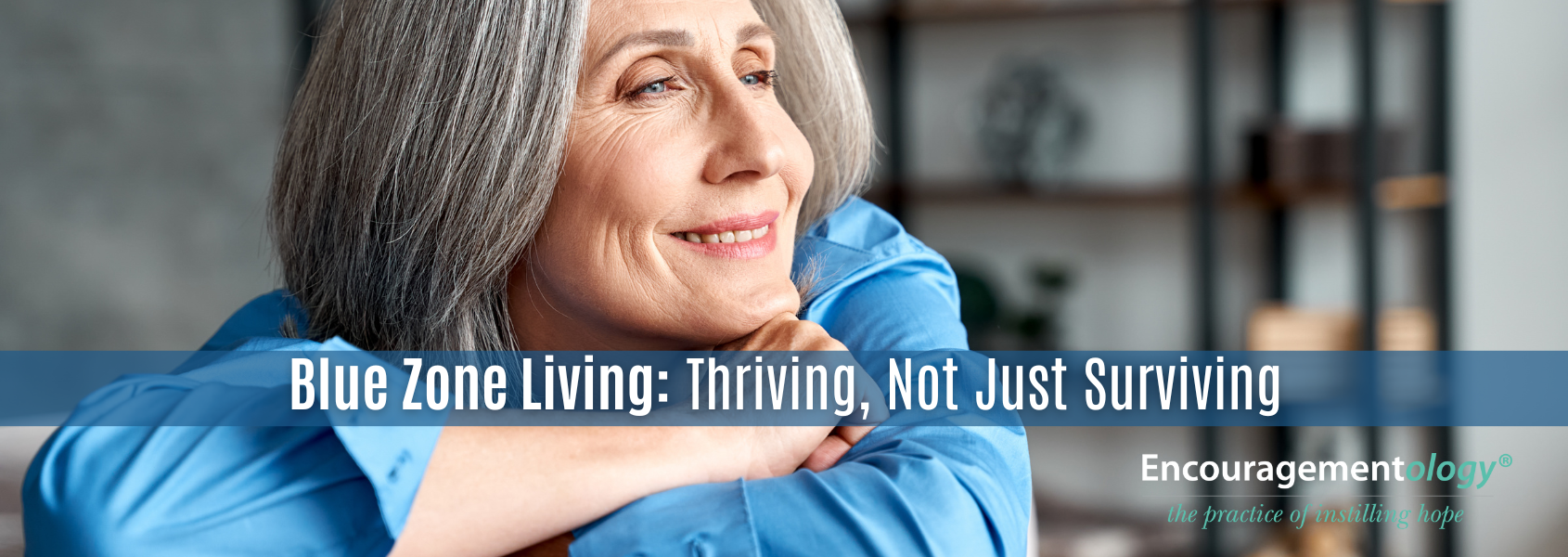SHOW NOTES:
On this show…we are exploring the phenomenon that is the Blue Zone as we embark on a life that’s thriving and not just surviving. Have you heard about the Blue Zone? Blue Zones are regions around the world where people live much longer than average, often reaching age 100 or older. These areas have been studied for their common lifestyle and environmental factors that contribute to longevity and overall well-being. Who doesn’t want to live longer IF you could feel good, achieve happiness, and be content? That’s the key, long life could be a burden if you are sick, lonely, and unfulfilled. So no matter where you are in your journey, you can pivot your thinking and embrace some new ideas to improve your quality of life and your longevity.
Dan Buettner is an explorer, National Geographic Fellow, award-winning journalist and producer, and New York Times bestselling author. He discovered the five places in the world – dubbed blue zones – where people live the longest, healthiest lives.
Buettner’s work is now spread across the country in partnership with municipal governments, large employers, and health insurance companies to implement Blue Zones Projects in communities, workplaces, and universities. Blue Zones Projects are well-being initiatives that apply lessons from the blue zones to entire communities by focusing on changes to the local environment, public policy, and social networks. The program has dramatically improved the health of more than 5 million Americans to date.
You may have seen his recent Netflix series, Live to be 100 where Dan travels around the world to discover five unique communities where people live extraordinarily long and vibrant lives. It really is a must-see for any age.
I was really excited to learn the four principles that span each zone.
- Eating wisely
- Moving naturally
- Connecting with others
- Having a purpose or outlook
Sounds simple right? Wrong. As I dug into my own perception of health and wellness I saw some skewed thinking and a real opportunity to change the way I looked at some of these things. So let’s dig into each of these to explore what we “thought” and how that might shife with a new perspective.
Cathy Wong from Very Well Mind lays out The Blue Zone Diet –
How to Eat Like the World’s Longest-Living People
Alexa Mikhail from Fortune explains the importance of social connections in the Blue Zones
Here are some key concepts of Blue Zone living:
- Plant-based Diet: Blue Zone residents typically eat a plant-based diet rich in vegetables, fruits, legumes, and whole grains. They consume meat sparingly, often as a celebratory or small portion.
- Physical Activity: Regular, natural movement is a part of daily life in Blue Zones. Residents engage in activities like walking, gardening, and manual labor.
- Social Engagement: Strong social networks and close-knit communities are common in Blue Zones. Regular social interactions and support contribute to overall well-being.
- Purpose and Meaning: Blue Zone residents often have a strong sense of purpose in life, whether through work, family, or community involvement. Having a reason to wake up each day is linked to longevity.
- Stress Reduction: Strategies for managing stress, such as taking regular breaks, napping, or praying, are common in Blue Zones. These practices help reduce chronic stress, which is associated with various health issues.
- Moderate Alcohol: In some Blue Zones, residents enjoy moderate amounts of alcohol, typically in the form of wine, with meals and in social settings.
- Belonging to a Faith-based Community: Many Blue Zone residents are part of a faith-based community, which provides social support and a sense of belonging.
- Family First: Blue Zone cultures often prioritize family and intergenerational relationships, with elders being highly respected and involved in family life.
CHALLENGE: Re-evaluate your thinking on what contributes to a happy and healthy life. Be willing to exchange some ideas that may be skewed with new concepts that have healthier payoffs. These principles not only promote longevity but also contribute to a higher quality of life and overall well-being.
I Know YOU Can Do It!

